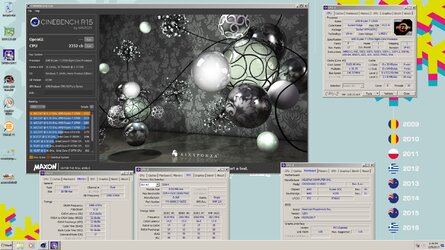Alaric
New Member
- Joined
- Dec 4, 2011
- Location
- Satan's Colon, US
CPU-Z gives you a whole slew of chips in their benchmark. 
Welcome to Overclockers Forums! Join us to reply in threads, receive reduced ads, and to customize your site experience!
VRM heat.
It's still producing a whole lot of heat Kenrou. These Fx 8xxx chips just need a whole heaping of power when Oced. I know when I take my chips cold with Dry Ice the amount of DICE I go though using the FX 8xxx Vs my I7 6700k or 4770k is significantly more. I actually ran a test once with the 8350 @ 5.2 ghz and my GTX 580 Lightning Gpu on board. I ran 3D mark Vantage and was pulling 821 w from the wall for the system.

You Scotty, are you forgetting where you live, all it does is snow, so you must be?!?Who's a snowflake?
Want to know just why I think that cinabench is totally bias AND BS? If you ever look and notice that in there main frame all they give you as a reference against your AMD CPU is Intel! NOT one AMD it's like Intel is the bais for the test and that is that! Shifty benchmark! I do not trust it at all! No way there are no other reference CPU's other than Intel listed no way that is fair or even CLOSE to being true!
Want to know just why I think that cinabench is totally bias AND BS? If you ever look and notice that in there main frame all they give you as a reference against your AMD CPU is Intel! NOT one AMD it's like Intel is the bais for the test and that is that! Shifty benchmark! I do not trust it at all! No way there are no other reference CPU's other than Intel listed no way that is fair or even CLOSE to being true!

Yeah, but the vrm heat though...
UT, I don't think that has been a particular problem with Ryzen like it was with FX. Ryzen is much better about power consumption that was FX. And we don't know for sure how or if that equation will change with Ryzen 2 but I imagine what we will see is the need to give a little more consideration to the motherboard chosen, at least on the bigger gun Ryzen IIs. The bottom feeder motherboards will likely not suffice for overclocking the upper end Ryzen IIs but I don't think it will be the issue it was with FX 8 core overclocking.
Thank you, sir. I read amd has better HT performance clock for clock compared to amd, but it just won't clock higher? Sorry if it doesn't make much sense I'm in a room with people talking.
I really want one now! Many say it's fun to clock them and having great HT performance is a plus because I do like video every once in a while. If I was getting one right now, I'd just bite the bullet and get the best Mobo, because it'll either make or break your cousin with regards to ivercloxking and features.
The FX Series has allot of potential for those that like to tweak their OC ....... Their big drawback has been their power consumption requiring one of the better Motherboards to handle the power draw and big cooling to handle the heat generated. Simply put the more you try to OC your FX Chip the more expensive it will get. Most boards can OC to 4.3 / 4.4 GHZ if you have adequate cooling but to really put the screws to the chip and get those big numbers you need to spend some big bucks on cooling. Yes Kenrou there are a few exceptions out there but they are just that .... exceptions. Here is a thread I did when FX first came out on what exactly I went through trying to cool an FX8150 to 5GHZ ......
http://www.overclockers.com/forums/showthread.php/715371-Build-FX-Tamer-Water-Cooled-Upgrade
You don't need to spend big to OC ..... here's another example of 4.7 Gig on a budget ..... but you won't get much beyond this without some bigger upgrades in cooling and most likely motherboard.
http://www.overclockers.com/forums/showthread.php/741239-FX-8-Core-with-Gigabyte-GA-990FXA-UD3(REV4)
There are plenty of examples of builds out there to look for we had allot of people come in over the last 5 years or so looking for help with their rigs OC ...... they all came down to heat / poor cooling or poor choice of a motherboard. If you decide to get an FX system take your time, figure out your expectations first and do it right the first time. I'm a good example of this ..... I had roughly $1000 Canadian in my cooling (that includes shipping and duty charges) to run 5.1GHZ 24/7 on my FX8370 with max temps on Prime 6hours + of mid 50*C ....... I would have to go look though backup drives to find my old results and frankly I have too much to do right now for that.
Good luck UT if you decide to do an FX build ..... ask some questions there as there are more then a few guys here that will help.
